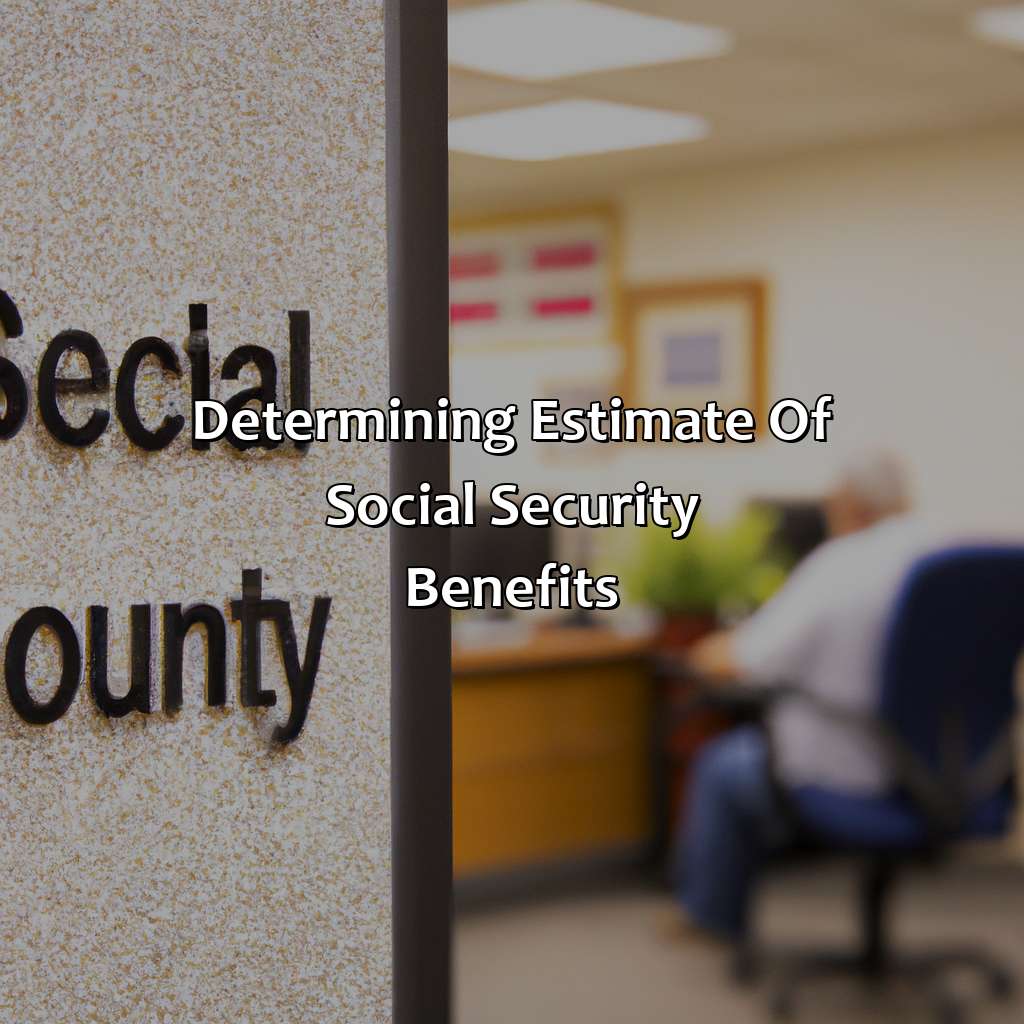How Can I Find Out My Estimated Social Security Benefits?
Key Takeaway:
- Understanding your eligibility criteria is the first step in finding out your estimated social security benefits. Age, work credits, and disability status are important factors to consider.
- There are three methods to determine your estimated social security benefits: reviewing your social security statement, using the online benefit calculator, or contacting the Social Security Administration directly for personalized assistance.
- Various factors such as timing of retirement, lifetime earnings, and marital status can affect your social security benefits. It is important to keep these in mind and plan accordingly to maximize your benefits.
Confused about your estimated Social Security benefits? You don’t have to be. We’ll show you just how easy it is to estimate them here. With the help of this guide, you’ll be able to quickly calculate and efficiently plan your future.
Understanding Social Security Benefits
Do you want to know your Social Security benefits? You need to know eligibility requirements and the kind of benefits you can get. Eligibility depends on age, work history, and disability. If you meet the criteria, you can get different types of benefits like retirement, disability, survivor, and family benefits. Let’s explore these further.

Image credits: retiregenz.com by David Duncun
Eligibility Criteria
To determine eligibility for Social Security benefits, you must have earned enough credits through paying Social Security taxes. Additionally, you must meet certain age and disability requirements. These requirements vary depending on the type of benefit you are seeking.
For retirement benefits, you must be at least 62 years old to begin receiving payments. However, the longer you wait to claim benefits, the higher your monthly payments will be. Disability benefits require a medical condition that is expected to last at least 12 months or result in death. Survivors’ benefits are available to spouses and dependents of individuals who have passed away.
To find out if you are eligible for Social Security benefits and estimate your potential payments, visit the Social Security Administration website or visit a local SSA office. They can provide personalized information based on your individual work history and circumstances.
To increase your potential payments, consider delaying retirement or continuing to work beyond age 62 to earn additional credits. It’s also important to ensure that your earnings record is accurate and up-to-date with the SSA by reviewing it annually and reporting any errors promptly.
Retirement, disability, survivorship – Social Security benefits have something for everyone except for those who don’t exist anymore.
Types of Social Security Benefits
Social Security Benefits are a form of assistance provided by the government to eligible individuals in the US. They aid in a person’s financial security during retirement or in cases of disability, death, or other exceptional circumstances.
The various forms of Social Security Benefits are:
- Retirement benefits: Payments received upon retirement or reaching full retirement age.
- Disability benefits: Monetary assistance provided to individuals unable to work due to a long-term disability.
- Survivor benefits: Provision of assistance to deceased workers’ dependents and widows in the form of monthly payments.
- Spousal benefits: Provision for spouses of eligible persons who have retired and begun receiving their Social Security benefits.
- Supplemental Security Income (SSI): Financial support given to elderly people over 65 years old and/or disabled adults who meet particular requirements.
Apart from these types, there are also special categories of aid available for military veterans, railroad employees, and other groups recognized by the law as being entitled to Social Security Benefits.
It is important to note that not everyone qualifies for Social Security benefits. The amount you receive depends on your past earnings, so it is crucial to know your estimated earnings and qualifying criteria before applying.
According to CNBC News, men aged 35-39 earn an average $50,050 annually, while women earn an average $39,542 yearly as reported by SmartAsset.
Time to brush up on your math skills because determining your social security benefits is like trying to solve a Rubik’s cube blindfolded.
Determining Estimate of Social Security Benefits
Estimate your Social Security Benefits with accuracy. Get your Social Security Statement, try the online benefits calculator, or contact the Social Security Administration. These can help you know what to expect.

Image credits: retiregenz.com by James Arnold
Social Security Statement
The Social Security Administration provides a document that estimates your future benefits called the ‘Estimation of Retirement Benefits’. This statement displays how much you have contributed to the social security system during your working years and what benefits you are eligible for. By checking your earnings record, it also shows if there are any discrepancies or errors that could affect the amount of your future benefits.
To access your Social Security Statement, go to their website and create an account. You can view and download your current and past statements at any time. It is recommended to review it annually, especially if there have been changes in income or employment status.
It’s important to note that this estimation is not a guarantee and may change based on various factors such as changes in laws or early retirement. Thus, it’s crucial to use these estimations as a guideline only.
An individual I know was unaware of the impact of delayed earnings on his Social Security Statement until he reviewed it recently. He realized that he could maximize his benefits by continuing to work for another few years instead of retiring early.
How to know if your retirement plan involves living like a queen or living like a hermit crab? Check out the online benefit calculator!
Online Benefit Calculator
To estimate your Social Security benefits, an Online Estimator Tool can be used. It provides personalized estimates based on your earnings history. The tool will require inputs such as your date of birth, expected retirement age, and estimated total earnings.
Below is a table that summarizes the key data you need to use the Online Benefit Calculator:
| Data to gather | Guidance |
|---|---|
| Your annual earnings | Check recent W-2s, tax returns or work records |
| Estimate of future earnings | Consider how much you expect to make over the remainder of your working years |
| Birthdate | Birth certificate or other official document showing date of birth |
| Spouse’s information | Including date of birth |
After using the online estimator tool and gathering all relevant information, you’ll have a rough estimate for your potential social security income during retirement.
One unique aspect of this Online Benefit Calculator is its ability to generate different results based on various what-if scenarios. For instance, individuals could see how their potential benefits may change if they decide to retire earlier or later than planned or if their lifetime earnings increase from continued employment.
To avail optimal social security benefits in the USA, we suggest keeping track of earned income and reporting it accurately. Additionally, delaying one’s claim for benefits can significantly enhance payments down the line. Finally, seeking expert guidance when necessary can improve an individual’s overall understanding of their options and help them make informed decisions regarding their social security filing status.
Contacting the Social Security Administration may feel like a game of phone tag, but it’s worth it to secure your retirement funds before the apocalypse hits.
Contacting Social Security Administration
When it comes to determining estimates of your social security benefits, it is important to know how to contact the Social Security Administration (SSA). To get in touch with them, you can visit their website or call their toll-free number. You can also make an appointment to speak with a representative at your local SSA office.
Through the SSA website, you can create an account and access helpful tools such as the Retirement Estimator. This estimator will provide you with an estimate of your future benefits based on your earnings history and projected retirement age. You can also request a more personalized estimate by filling out form SSA-7050.
It is important to note that these estimates are not guaranteed and may change based on changes in the law or your personal circumstances. It is recommended that you regularly review your earnings record with the SSA to ensure accuracy and maximize your potential benefits.
Interestingly, before 1935 there was no federal program that provided assistance for elderly Americans who could no longer work. Poverty among elderly people was common during those times, but in response to this issue President Franklin D. Roosevelt proposed a social security system as part of his New Deal reforms. After much debate, the Social Security Act was finally passed in 1935 and signed into law by President Roosevelt.
Your social security benefits may be affected by factors like your lifetime earnings, retirement age, and whether or not you angered any fortune-telling gypsies in your youth.
Factors Affecting Social Security Benefits
If you want to figure out your Social Security benefits, there are three important things to consider:
- When you retire
- Your lifetime earnings
- If you’re married
Take a look at this section: “Factors Affecting Social Security Benefits.” We’ll dive into each of these topics, so you can gain an insight into how to get your estimated benefits.

Image credits: retiregenz.com by David Jones
Timing of Retirement
Retiring at the optimal time can significantly affect your social security benefits. Delaying retirement may increase the benefits, especially if you delay past full retirement age. On the contrary, early retirement can reduce your payout by up to 30%.
Choosing when to retire shouldn’t be an impulsive decision; instead, it should be a well-thought move based on certain factors that may influence your social security benefit, such as your age at retirement, work history and marital status.
It’s essential to know that every person’s situation is unique and requires careful analysis before making any decisions. Hence it’s recommended to consult with Social Security Administration (SSA) or financial advisor regarding this matter.
According to SSA, if you wait until you turn 70 for taking Social Security payouts, then you could receive around eight percent more annually than if you started receiving payouts at age 67.
Source: https://www.ssa.gov/planners/retire/delayret.html
Looks like my lifetime earnings won’t even cover the cost of my funeral, let alone leaving anything for my loved ones.
Lifetime Earnings
Over the course of your working life, your income history is an important determinant of your future Social Security benefits. Your aggregate income, coined as your ‘Accumulated Lifetime Earnings’ over time plays a crucial role in computing monthly Social Security retirement benefits.
These lifetime earnings are calculated by averaging your highest 35 years of earnings indexed for inflation and the resulting average is used to determine your primary insurance amount (PIA), which in turn defines how much money you receive each month from Social Security at full retirement age.
It’s worth noting that the more you earn, the more your average increases and so does your benefit amount. It’s essential to track and verify your annual earnings with social security at least once a year to maintain accuracy, detect any errors or report discrepancies that might affect future benefit amounts.
Don’t wait for financial surprises! Make sure you’re making smart financial decisions and maximizing your earning potential now while also keeping yourself informed about what benefits await down the road.
Marriage may be a beautiful thing, but it also affects your Social Security benefits – so choose your partner wisely!
Marital Status
The influence of one’s conjugal condition on social security benefits is significant. It affects eligibility to some specific benefits and impacts the amount one can receive in a retirement or spouse benefit. Couples can receive higher spousal payments while divorced individuals may also claim ex-spouse benefits, but certain requirements must be met. The calculation for widow or widower benefits also depends on the length of the marriage.
As you consider your retirement plans and entitlements, other factors impacting Social Security Benefits exist. For instance, work history and earnings play an important role in qualifying for specific payments such as disability and survivor benefits. Age when claiming is another crucial factor influencing your payout rates.
Understanding all the factors that affect Social Security Benefits can be overwhelming, which makes seeking expert counsel a smart idea. You should speak with a professional financial advisor who can discuss any unique circumstances regarding your situation based on your personal history to help ensure optimized payouts for your needs.
An example of how marital status plays into these calculations is Margaret’s case; she is 64 years old and single for ten years after divorcing her husband of thirty years. She needs to retire soon but wonders if retiring today will reduce her payout of social security (based on age) because her now-deceased former husband earned significantly more than she did throughout their marriage. Through counseling, Margaret learns that by waiting until Full Retirement Age (FRA), she could earn much more monthly payout from an ex-spousal payment instead of taking less from her own record at age 62.
Some Facts About How to Find Out Your Estimated Social Security Benefits:
You can find out your estimated Social Security benefits by creating a my Social Security account on the official Social Security website. (Source: Social Security Administration)
The Social Security Administration mails annual statements with estimates of your retirement, disability, and survivor’s benefits. (Source: AARP)
The estimated benefits provided in the statement assume that you continue to work until full retirement age. (Source: The Balance)
Social Security benefits are calculated based on your average indexed monthly earnings over the 35 highest-earning years of your career. (Source: Investopedia)
You can use the Social Security Administration’s online Retirement Estimator to get personalized estimates of your future benefits based on various scenarios. (Source: Social Security Administration)
FAQs about How Can I Find Out My Estimated Social Security Benefits?
How can I find out my estimated social security benefits?
Answer: You can find out your estimated social security benefits by creating an account on the official Social Security Administration website and using their online estimator tool.
What information will I need to use the online estimator?
Answer: To use the online estimator, you will need to provide your date of birth, Social Security number, and your most recent earnings statement.
What if I don’t have access to the internet or prefer not to use the online estimator?
Answer: You can also call the Social Security Administration at 1-800-772-1213 and request a statement of your estimated benefits.
Will the estimated benefits I receive be the exact amount I will receive in the future?
Answer: No, the estimated benefits are not guaranteed to be the exact amount you will receive in the future. Actual benefit amounts may vary based on changes in your earnings and other factors.
Can I receive social security benefits if I have never worked or paid into the system?
Answer: In general, you must have worked and paid social security taxes for at least 10 years to be eligible for social security benefits. However, there are certain special circumstances where you may be eligible for benefits even if you have not worked or paid social security taxes.
Is it possible to collect social security benefits while still working?
Answer: Yes, it is possible to collect social security benefits while still working, but if you have not reached full retirement age, your benefit amount may be reduced if you earn income above certain limits. Once you reach full retirement age, you can work and earn as much as you want without affecting your social security benefit amount.
 Checkout this IRS Loophole
Checkout this IRS Loophole 
